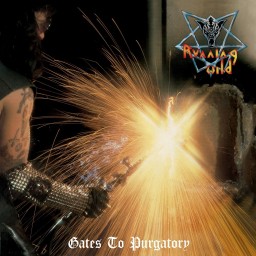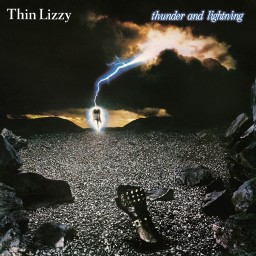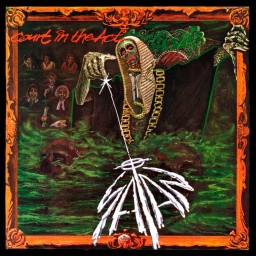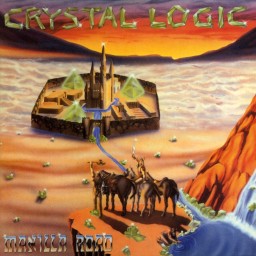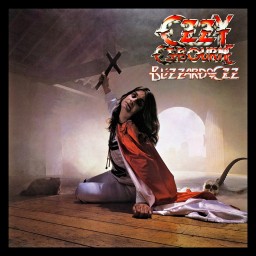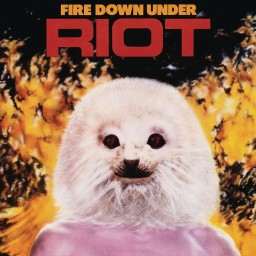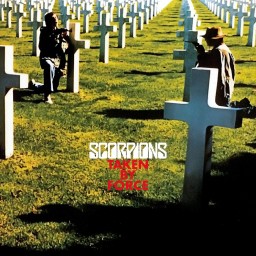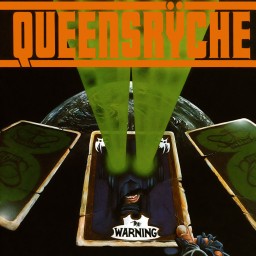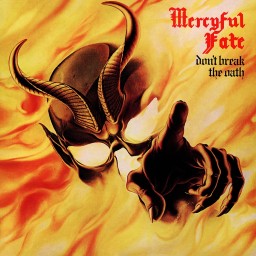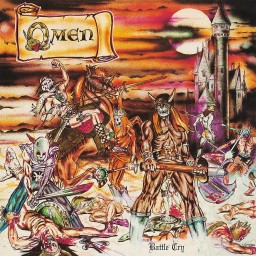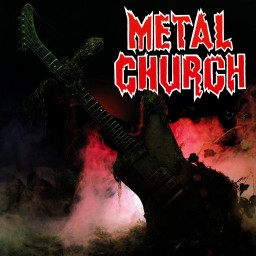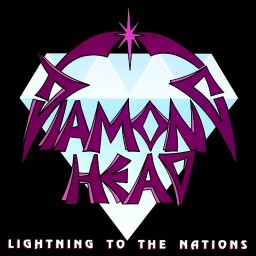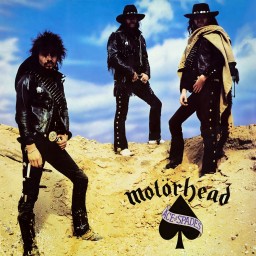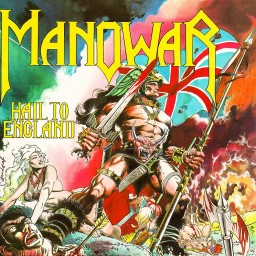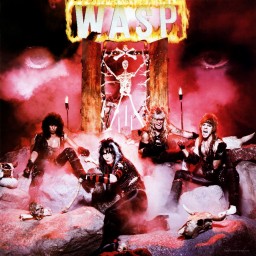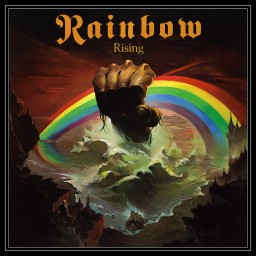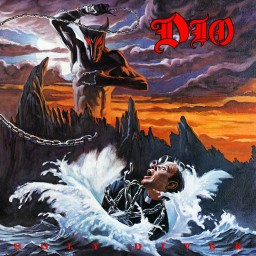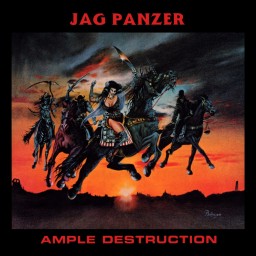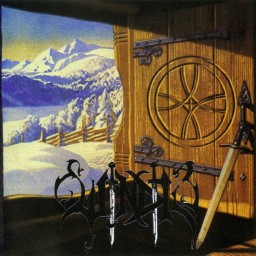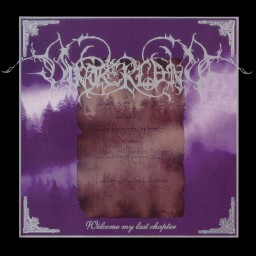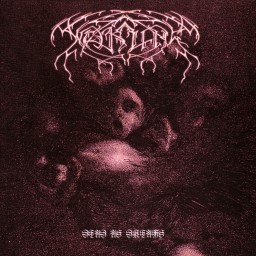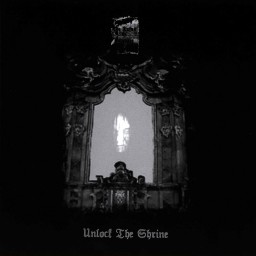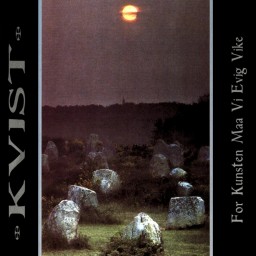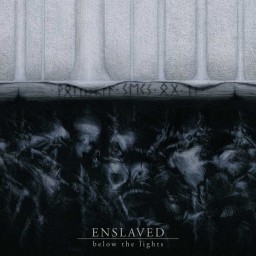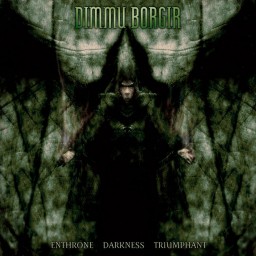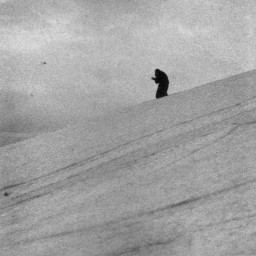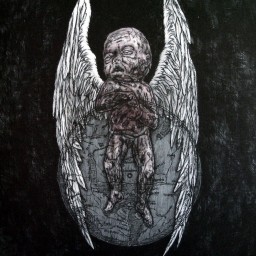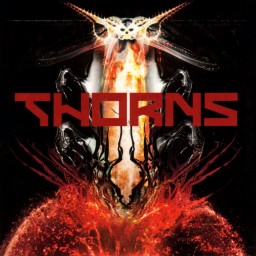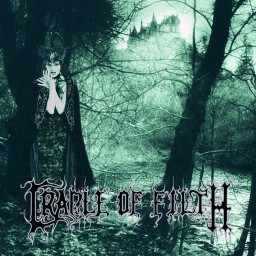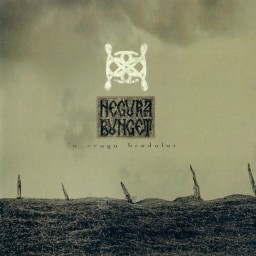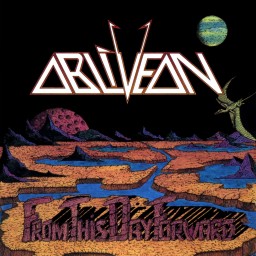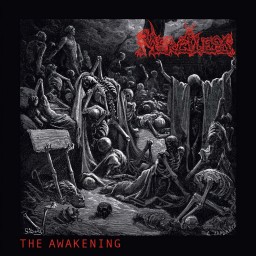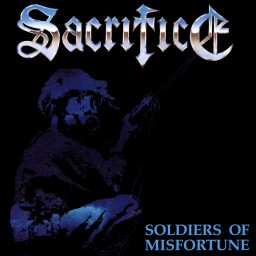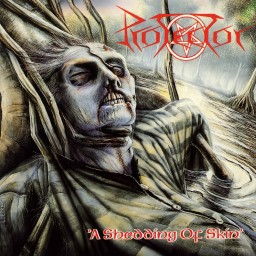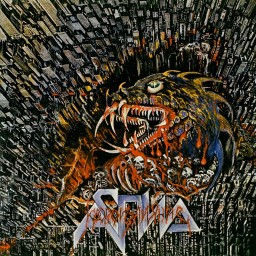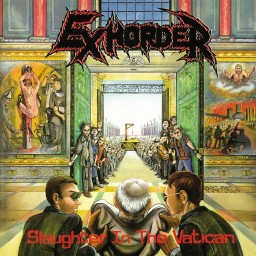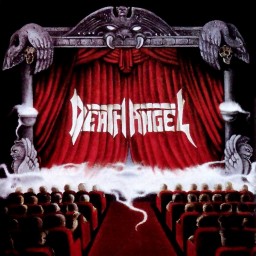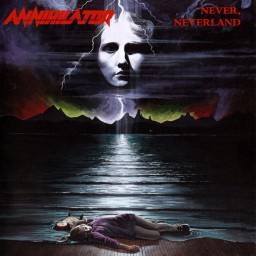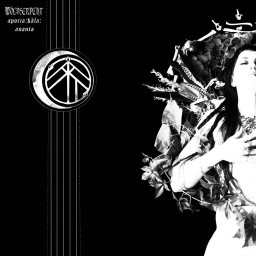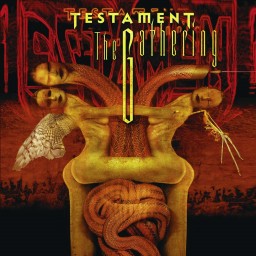Vinny's Reviews
The debut from Running Wild ticks all the boxes in terms of balls to the wall metal intensity. Considering what the band were to become over the years it does stand out as a weak point also. Despite the points it achieves for effort the delivery is poor and one-dimensional. You are essentially listening to the same track over and over again, such is the lack of variety on the album.
It is hard to tell where one track stops and another begins as at times breaks between tracks seem like pauses on one long track as the next rack that starts adheres to pretty much the same pace, tempo and structure. The songwriting criteria on this record did not have the bar set very high at all it seems. Now, this is not to deny the credentials of the musicians involved. What quality is here is delivered by obviously individuals, the guitars in particular save the day on more than one occasion but they can only do so much I am afraid.
I think considering this was their debut and maturity clearly was lacking there is perhaps an argument to give them a little more slack but when your thought process is to regurgitate the same riffs and occasionally say menacing words like "satan" then the game plan is too flawed from the off. Yes, the core heavy metal component parts are here but they feel force-fed as opposed to being offered in any discernible menu format. Imagine a meal where all four courses are the main meal, you get the same meat dish over and over again and this pretty much is what Running Wild serve here.
Genres: Heavy Metal Speed Metal
Format: Album
Year: 1984
1983 and album number twelve for Lizzy and by this point we have already had the likes of Nightlife, Fighting, Jailbreak, Johnny The Fox and the superb Black Rose. Things have gone off the boil a tad with Chinatown and Renegade and so we are on a downward spiral now, right? Actually, half right. Lynott's last album is not a high point by any means. Overall it is a patchy affair with the odd snippet of catchy brilliance and well played hard rock music to give the listener some flashes of what once was. You have to sit through some nonsense also unfortunately.
The album does open strongly with the title track stomping its authority early on with its stomping keys teeing things up nicely. Lynott's gruff vocal delivery complimenting the fast-paced track well. Unfortunately the album takes a sharp dip after this with the clumsy This Is the One stumbling along with a slight off-kilter rhythm seemingly a stretch too far for Phil to pace with and at times the track almost feels like the lyrics are somehow a word or two short forcing other words to be stretched out uncomfortably. The excellent guitar work of Gorham and Sykes makes up for this to some degree though but overall it's a poor track very early on in the track listing.
To follow this with a slow-paced ballad seems to throw lacklustre after poor in all honesty, not that The Sun Goes Down is a sterling piece of songwriting with its over-brooding bass line quickly becoming overbearing, particularly alongside the underwhelming chorus. Again the lead work goes some way to performing a rescue job but it is glitter on a turd at the end of the day. The more catchy The Holy War ramps up the pace again soon enough with its arrogant lyrics and thumping skins supporting the choppy riffs well. The track gets the blood pumping nicely after the early lull in the flow of the record.
This upward turn continues with the pounding rhythm of Cold Sweat driving the record along with an engine like efficiency, not afraid to mix up the structure along the way and fire in a few licks to keep things interesting. This is perhaps the finest moment on the record kicking off side B superbly. Unfortunately though, as with side A we immediately get lost in the overly melodic Someday She Is Going To Hit Back which even the guitar work can't save. The cheesy Baby Please Don't Go lacks maturity and it suffers badly from poor lyrical content and a lacklustre pace.
Closing out the album strongly is one of the reasons why this rating kept the right side of three stars and didn't slip to a half star in the wrong direction. Bad Habits is another one of those infectious tracks that slap away the memory of the albums weaker points and gets head and foot going again. Similarly closing track Heart Attack, although not sterling in quality, hits with enough punch to leave a mark as things draw to a close. Not terrible but would have been nice for Phil to have left us with a more consistent swansong.
Genres: Heavy Metal
Format: Album
Year: 1983
Here's an odd one. I have heard of Satan of course but never really been swayed by the praise that surrounds them. So having stumbled across this album again today as part of my current clan challenge I didn't have high hopes. The band name is synonymous with the NWOBHM movement of course and rightly so, there's some hi-octane galloping tunes on here for sure. There's also obvious talent across the group with the vocals of Brian Ross and dual guitar attack of Russ Tippins and Steve Ramsey being of particular note.
Somehow though, it is still a bit dull. This may be down to the production or mixing job as opposed to the actual band themselves as somehow it sounds like the album was recorded at two different levels. So the guitars are rampant, high in the mix, clear and audible for all to hear as they fire of super-charged licks and riffs. However, the rest of the instrumentation sounds like it was tracked from a different studio. If sounds stifled or muffled and it is only really the piercing cries of Ross that usually manage to permeate the low ceiling and sound like they are on the same record as the guitars.
It makes for a very disjointed sounding record. Literally it feels like two mates in one of them's bedroom playing guitar well over an otherwise half decent record because they haven't got anything to satisfy that particular six string itch they have both got. It is a genuine shame the album sounds like this as despite the sound issues (to my ears at least) the band has a real sense of being full of energy and being eager to impress.
If you can deal with the sound then you are probably in for an enjoyable NWOBHM experience - and I did listen to this via YouTube so that won't have helped most certainly - given they have the content and credentials most definitely. For me though the album doesn't hit the spot and feels muddled despite its strong points.
Genres: Heavy Metal
Format: Album
Year: 1983
Now we are talking! A few albums in life define genres perfectly. In the quest for true, classic and authentic epic heavy metal if you do not find yourself lead to Manilla Road then you are clearly on the wrong path. Crystal Logic is a rarefied slab of 70's rock infused with NWOBHM and humongous riffs of labyrinth like proportions. Add to it the perfect nerd value of the vocals and their exaggerated, theatrical musings over fantasy themed lyrics. Who doesn't want to hear:
"Upon the Island of Damnation
The Horde of Hades screams and wails
The blood of life and execution
Has put back light into the Veils"
There's a good chance many are put off by the vocals. However, I cannot think of any better requirement for a sneering and at times clunky vocal accompaniment to the chronicles that are written for this record. Despite the largely nasal sound to them there is still range in Mark Shelton's vocals here. There's a gruff bark to them where required and the odd scream to add further drama to the performance. Manilla Road would not be the band that we all know them to be without Shelton's unique style and the metal world lost a true legend when he passed in 2018. On Crystal Logic he not only entertains with his vocal talents he also provides all six (and twelve) string action as well as being chief songwriter.
Far from putting bassist Scott Park and drummer Rick Fisher in the shadow of their leader, they take the opportunity to place optimum focus on their individual performances. The sound has a really full, complete and powerful feel overall as a result. Although I do feel the drums are a little low in the mix it is still on the side of being the correct balance. The subtlety of the percussion adds dimension to an album that relies on no keyboards for atmospherics. The whole album feels grimy and dank yet has an energy to it that belies what you may interpret to be its intended mood.
I can even forgive John Jinks' artwork. Basic though it is, there is still a vibrancy to it that kind of sums up the record brilliantly. I have the 2013 remaster (which may explain the drums) that has a second disc showcasing unreleased songs, rehearsals and live tracks which is a great addition to the regular release.
Genres: Heavy Metal
Format: Album
Year: 1983
Ozzy's debut solo effort packs a fair punch in terms of tunes. Immediately recognisable tracks like Crazy Train, Mr Cowley, Goodbye to Romance and Suicide Solution all drop enough hooks in you to leave you feeling like a cow carcass in the abattoir. There are tracks listed here in this review that have prevalent on playlists galore throughout over 30 years of listening to metal that have no sign of being lifted anytime soon.
The more commercial sound is a change from what we had come to expect from Ozzy's Sabbath days and when compared to most of what BS had done until this point you can't help but feel the record is inferior. As a standalone hard rock album with more than a fair share of big riffs of its own it was a fine start to furthering his long career and whilst not perfect it was certainly more than able to stand up in the shadow of his work with his more infamous other band.
Of course the bringing of former Quiet Riot guitarist , Randy Rhoads into the fray was a master stroke. His studious and assured performance here being one of the highlights of the album as whole. Literally setting tracks alight with his fret work he is most certainly the perfect accompaniment to Osbourne's unique and familiar vocal style in that he forces you to listen beyond the vocals.
Even on the weaker tracks that close out the record, his influence is obvious and saves the tracks from descent into becoming completely forgettable. As a debut release it does lack the finesse you would perhaps expect from an established artist such as Ozzy but the album set off a trajectory of future releases that showed consistent improvements.
Genres: Heavy Metal
Format: Album
Year: 1980
Riot are a band that have always been in my sphere of awareness but somehow have never made it on my radar to delve into their extensive catalogue. Their 1981 effort offers high energy rock music with a NWOBHM pace applied for good measure. Opening strongly with my new favourite quarantine anthem of Swords and Tequila this rapid pace continues well into the title track Fire Down Under with its blistering lead work and relentless stomp carrying forward well the opening momentum of the record.
All elements of the group work really well together and the tracks feel tight and competently written. Reale and Ventura's guitar work is of particular note, built on catchy riffs and bluesy melodies, their chops really expand the listening experience well. They are superbly supported by the assuring rumble of Leming's bass that is audible yet not distracting in the mix. It is Speranza's vocals that underpin everything really nicely though. Gritty and gruff throughout his style compliments and showcases the bands energy levels, settling in nicely in the mix and providing a memorable yet never over the top or showy performance. The drums of Slavin also feel perfectly stationed in the mix providing power where needed yet also still being subtle enough to not become overbearing.
For album number three, there's a solid amount of maturity on display here and the whole release shines with a level of consistency. There's an element of Aerosmith style rock to some of the tracks, particularly when referencing the more bluesy elements of the guitar work. It is hard to get too excited over it though, consistent though it is the flip side of this is a lack of variety. It is playbook easy listening metal/hard rock music that maintains its energy levels well but does become a bit of a stretch considering there are ten tracks on the album. It would certainly have benefited from a trim even though it clocks in at just under forty minutes.
Genres: Heavy Metal
Format: Album
Year: 1981
The Scorps had been around for thirteen years by the time they got around to album number five. They had only been knocking out recorded content for five years of that time, consistently gracing the shelves of record stores since on a near annual basis since 1972. After the controversial Virgin Killer in 1976 the band dropped Taken By Force twelve months later with the US version being delayed until 1978 as the previous record had only been released in early 1977. It is a complete anomaly to consider the band a metal band at this stage, there sound was very much at the rock edge of things and offered little in the way of anything heavy for sure.
Although there is nothing intrinsically wrong with the album it is hardly chock full of anthems like Lovedrive or Blackout for example. As a result it just passes you by and you soon forget you ever played it at all really. There is a real feel of them settling for some good tunes and ideas but never really building on them to provide any "wow" factor. Yes, there's a couple of hooks here and there and the odd catchy riff that gets me to look up from my desk but I am soon back beavering away with little if any attention being given to the music.
For a band at album number five I expected more to be honest, certainly one that had been together for over a decade. My experience of the Scorpions was that they peaked early in the 80's and really should have had a stronger run in to that point in time instead of almost petering out of the course of two or three records. There's tracks here in a style any fan will recognise as they deliver smoochy ballads and tongue in cheek energetic rock songs like He's A Woman - She's A Man that harks to the more humorous side of the group. But still there's little here to get overexcited about.
Genres: Heavy Metal
Format: Album
Year: 1977
Yawn.....
My interest in Queensryche is limited to one album in their discography, Empire. This was of course the pinnacle of their accessibility, combining mass appeal, catchy tunes with strong storytelling based song structures. I have never really understood the appeal of the band at any other point in their career. Even the much lauded, Operation Mindcrime does little for me so the one dimensional and largely flat debut holds little of my attention whenever I bother to listen through.
Accepting this was their debut and the band had some craft to still learn and finesse there is still a massive amount of bluster here for very little effect in terms of memorable and powerful output. The bare bones of their more recognisable songwriting prowess was here at this point most certainly. The drama of their brand of theatrical, progressive/power metal apparent in the vocal style of Geoff Tate from virtually the opening track. But he sounds excessively nasal on this record (which could be due to the fact I can now only locate a remastered copy) and this makes the vocals sound forced unfortunately.
Notwithstanding the obvious credentials of DeGarmo and Wilton there is little in the way of anything remarkable from them here with Jackson and Rockenfield generally going through the motions in the background and it all makes for a very dull experience despite it being clearly geared towards being a prog metal record. There's no bite or energy to proceedings despite nothing much really being that bad or wrong with the playing. The album sounds like a band with an over-enthusiastic vocalist who joined a group of mates who just weren't that interested in pulling out anywhere near as many stops as he clearly was.
Genres: Heavy Metal
Format: Album
Year: 1984
King Diamond was and always will be the weakest link in Mercyful Fate. Quite an opening statement for a review of one of metal's best known albums I know, but one that reflects my opinion of the band perfectly. No attempt at controversy here folks, just an opinion built on my experience of most of their discography. As a presence he is undeniably an asset. Menacing, foreboding and threatening, his very face is iconic in terms of all the dark and nefarious things that our preferred genre of music espouses. Vocally though he is poor, his attempts at the higher end of the scale of notes coming off as farcical in the main. He's far better when he drops to the more grim and murky style he deploys that suits the overall tone of the music so much better.
Right now your asking yourself "why he's given it such a decent rating if he hates King that much?". The fact is that for all my criticism of the vocals I cannot neglect the fact that the rest of the artistry on this album is excellent. In all reviews that I write where I score an album low it is because something catastrophic encompasses the whole experience that makes it an irretrievable disaster. This is not the case here. Wherever else I look on the record the quality is high (with the odd dip of course), whether it is the songwriting or the musicianship, neither are diminished in terms of their impact by my beef with the vocals.
Hank Shermann and Michael Denner truly show us what capable and intelligent six-stringers they are on this record, wielding their axes with poise and guile. On more than one occasion they rescue a track and make the directionless or clunky structure of a track seem manageable and clearer just by their presence. "Grabber" and Ruzz provide the real rhythm in the engine room giving the record legs when it needs to run faster and also able to subtlety control the pace when it need reining in a tad.
So "Don't Break The Oath" is not a complete album for me as it suffers badly at the vocal chords of King and even the sterling band that sits around him can't elevate it to the levels of praise that the album seems to get across the board. It does not mean however it is a bad or even an average record, more just lacking in one important and influential area.
Genres: Heavy Metal
Format: Album
Year: 1984
There's not a lot wrong here I have to say. Considering the fact that I had never heard of the band until this week it is surprising that they have flown under my radar for such a long time with them having such a strong debut to kick off their careers with. The bands style of aggressive power metal with a NWOBHM edge and some firm nods to the traditional aspects of the heavy metal sound are right up my street I have to admit.
Formed by guitarist Kenny Powell the band had a bit of a disrupted tenure, being completely inactive from 1989 through to 1996. Their initial first four years together saw a steady decline in quality from their debut culminating in the much derided 1988 offering, Escape to Nowhere featuring Coburn Pharr of Annihilator fame on vocals. The late J.D. Kimball held the vocal seat for the first three albums and what a great job he did. His gruff and yet also melodic style embellished the power metal aspect of the band's sound well and is one of the real memorable points from the debut album for sure.
Also of particular note is how tight the band are generally in terms of their sound on this record. They sound well organised and well-heeled also, taking not overly complex tracks and letting them shine with memorable choruses and energetic lead guitar work courtesy of the aforementioned Kenny Powell. The percussion section motors along, perpetuating the feeling of the cohesive unit whilst the odd smattering of fantastical theatre elevates the tracks they are present on to new and intriguing heights.
Working tirelessly for ten tracks of enchanted drama the band incorporates a selection of song titles to make the teenager in everyone squeal in delight. Who doesn't want to hear an album in full when you see tracks like Dragon's Breath, Be My Wench and Prince of Darkness on the album listing? Neat find to get me through quarantine and beyond.
Genres: Heavy Metal
Format: Album
Year: 1984
In the top twenty albums of all time that I have never understood the attraction of I would add the debut from Metal Church in the top five. It does get oodles of praise and attention from virtually all corners of the known universe but I just don't get it I am afraid. To start with, I have always found David Wagner to be overrated as a vocalist. I mean his voice is unique most definitely, I have little grounds for argument there. But it just lacks an real punch when needed (and the album needs a lot more punch in my book) to elevate the promise of an intense and raging metal album that rarely gets past growling stage.
The album opens with more than enough promise. The big build up to Beyond the Black serves to lift expectations from the off but somehow it just peters out into a very mediocre and forgettable track. The title track is guilty of pretty much the same thing, talking a good enough game to begin with but then delivering a half-arsed performance. It is like all the good ideas were used up on intros to tracks instead of focusing on the long game.
There's not even any real dazzling leads or solos to look to for comfort that things are going to live up to expectations. What few there are of these are average and far too obvious and predictable. It is not to say that Vanderhoof and Wells are poor players though, I think the arrangements of the tracks themselves are off in the main and this kind of shoe horns their work in around twisted or poorly constructed songs. Instrumental track Merciless Onslaught tries to showcase the skill on display but is just all a bit senseless as opposed to merciless.
The one track I find has any discernible form is side A's closer Gods of Wrath this actually flows like all the other tracks should do. With its mid-tempo and paired back feel the lead work really shines and the track feels that it has some overall direction. Not even a cover of Deep Purple's Highway Star rescues proceedings as the band try to close the record out with a bit of style. The effort feels forced and rushed, like the track itself is forcibly taken out of context as opposed to the band putting their own stamp on it. Very overrated record.
Genres: Heavy Metal
Format: Album
Year: 1984
Stourbridge's finest made an entrance into the NWOBHM sphere way back in 1980. Their debut album Lightning to the Nations had its fair share of classics to share with the fledgling metal community of the time. Tracks such as Am I Evil, Helpless and the lurid Sucking My Love all got heads nodding and feet tapping respectfully along tho their catchy chorus' and infectious riffs. Metallica famously covered Am I Evil adding to its value as a metal anthem.
The fact is though that beyond the "hits" the debut album was a tad flat. Even the title track struggles to stand up that well for me and the album seems to feel like a track heavy EP as opposed to a full length. The intention is all good but it is just not delivered that well in the main. The barking and groovy riff to Sweet & Innocent isn't good enough to build a whole track around and it just becomes annoying really quickly.
The snappy guitar style on It's Electric again doesn't have the repute to hold for the whole track and naff lyrics just make for a boring and repetitive track. Throughout much of the album though, songs are saved somewhat by the sublime lead work of Brian Tatler who remains one of the unsung heroes of guitar playing in the world of 80's metal. His solos are a notch above most of everything else that is on the album here. Everything is solid enough but also a bit drab in comparison.
Barring Tatler and Sean Harris' warbling vocals there's not much else to remember here from a decidedly average release that gets way too much attention and plaudits when compared to the finished product.
Genres: Heavy Metal
Format: Album
Year: 1980
Five albums in and Motörhead actually were motoring. On Parole aside the band was enjoying much success with their first three albums with Overkill and Bomber showing what the band were really capable of. The established line up of Lemmy, Filthy and Fast Eddie had gelled together well and the momentum showed no sign of abating with the impending release of Ace of Spades.
The anthemic title track remains one of their best known songs to this day, but this record also has my personal favourite track, (We Are)The Roadcrew . The rest of the album though is a bit of a mish-mash of full on speed metal paced rock 'n roll that doesn't all stick to the wall it gets flung against at near a million miles an hour. Sticking to a tried and tested formula is all well and good and most definitely served the band well for the bulk of their career but here some tracks do just kind of pass you by. Live to Win, Fast And Loose and Fire, Fire are particular victims of this despite the latter songs best efforts at a catchy chorus.
As much as I have played the hell out of this record, I never thought until today when I sat down to review it just how patchy it actually is. I mean let's be clear here. It is never terrible, in fact it doesn't stray into the territory of ever being bad even. There's just a lot single tracks merging into one wall of entertaining yet very familiar sound. The album really needs a couple of more anthem like tracks to lift its stature that bit higher for me.
It seems almost bizarre to criticise a Motörhead album for following a set format and believe me, I ain't looking for no massive variety here just a bit more memorability. After the lukewarm On Parole the bar wasn't that high and I would argue that things didn't pick up again album wise until Orgasmatron some six years after this release.
Genres: Heavy Metal
Format: Album
Year: 1980
I have never fully understood the draw of Manowar. In fact I had (until today) always found their records to lack some degree of punch and power, certainly considering all their puffed up posturing at least. Whether it is an increase in tolerance levels with age or just the fact that I have been a dick all of these years and am finally coming round is open to interpretation, the fact is that despite half convincing myself I wasn't going to enjoy Hail to England I actually got on quite well with it.
Yes, it is still far too pompous and overbearing for me to all of a sudden be calling myself a fan of theirs, but I was actually impressed by the lead work of Ross on this album and although on more than one occasion my finger strayed dangerously close to the skip button I never once pressed it when Adams' vocals started to grate. As most tracks got going there was a mental note to self that read something along the lines of "this is not going to get played through to the end", however a full thirty three minutes was heard.
There's a consistency here that you can't fight. The album does exactly what it says on the tin. Sticks out it's chest, pulls back the shoulders and charges headlong into battle, raising epic tunes as it goes. Considering this was released in 1984 it is a surprisingly full sounding record that is not afraid to do a fair share of shredding to entertain the listener. On sheer lack of fucks to give rating the album gets five stars all day. It goes too far on Black Arrows though, coming off as a poor man's Eddie Van Halen (although I applaud the effort), but it does right itself with Bridge of Death to close things strongly.
Taking it that everyday is a school day and you're never too old to click with a band you'd long since given up on I will chalk today as being a good day.
Genres: Heavy Metal
Format: Album
Year: 1984
The frenzy surrounding W.A.S.P. and much of the early part of their career often disguised the fact that aside from them displaying what some felt to be shocking sexual audacity and beastly intent, they actually released one of the best debut albums of the time. After the furore over Animal (Fuck Like A Beast) the band didn't bat an eyelid and got on with pushing their debut down the throats of whoever would listen. Taking the traditional rock elements and adding more than a fair few coats of shock over the top still should not be the only reason Lawless and co are recognised for their achievements in metal. The self-titled debut is strong, full of hooks and catchy lines that stayed in your head long after the curtain fell on any associated theatre.
The album might be seen as a romp in more ways than one but at the end of the day this was the album the band wanted to put out and it sounds like it too. There genuinely were no fucks to be given on this record and the band made this record for nobody else other than themselves, the fact that not only did it wind the PMRC up to epic proportions but also went on to sell gold in the US and Canada only added to the irony of Tipper Gore and co's derision.
Anthems just kept coming from all sides on the album. Whether it was I Wanna Be Somebody, L.O.V.E. Machine, Hellion or The Torture Never Stops the album was destined to stay in the hearts and heads of all who heard it. The ability to write obtuse and shocking lyrics was tempered also by the fact that the same band could deliver softer tracks like Sleeping (In The Fire) and still retain that garrish edge whilst doing so. W.A.S.P. weren't as primitive as people would have fans believe.
Yes, there's some filler on here (hence the 3.5 stars) but this was the debut and if ever there is a time to forgive a bit of filler it is on a bands first outing into full length release territory. Rock out with your cock out folks!
Genres: Heavy Metal
Format: Album
Year: 1984
This is perhaps one of the most succinct records in any genre of metal/hard rock. At only six tracks in length and just over thirty minutes total run time, Rising does well to get its message across so impressively in such a short run time. Opening track Tarot Woman probably showcases this ethos best of all the tracks on the record, with its galloping rhythm and melodic keys balanced against a catchy lyric sheet across a track that adds psychedelic tinges to embellish the very mystery of the lady in the song. It is equal amounts classic Dio and Blackmore encapsulated in six minutes of well written hard rock.
Second track, Run With The Wolf keeps the pace up nicely adding a more metal feel to proceedings as Dio applies his trademark grittyness to his vocal delivery, he seems to control the tempo of the track all by himself like some metal composer arranging his symphony around him. The insanely catchy Starstruck soon follows with an almost cabaret beat that sees Blackmore firing licks left, right and centre over a rampant rhythm section.
The cheeky Do You Close Your Eyes continues the showy performance with its big chorus line constituted of the somewhat clumsy lyrics that Dio somehow still manages to make an impressive job of delivering. By far the most impressive of the tracks on the album is Stargazer with a slow to mid-tempo soaring on warm uplifts from Carey's keys that give Blackmore's riffs a floating feeling, his eastern promise sliding lead work giving an added depth to an already lush and vibrant track.
Album closer A Light in the Black stands things down nicely being the second eight minute plus track that made up side B of the vinyl format. This is a racey number to end on and works really well, letting things go out on an uptempo high instead of a brooding ballad. This was Rainbow in their prime most definitely and it shows on this record.
Genres: Heavy Metal
Format: Album
Year: 1976
Had Ronnie James Dio not left Black Sabbath the first time around there's every chance that Holy Diver would never have happened. Shudder at that thought a moment before I get onto my dissection of arguably Dio's strongest release. Holy Diver seems to be a route one "go to" album for most metal fans when talking about "all time top five/ten heavy metal records" lists, usually charting quite high in such conversations.
This is because the title track, Stand Up And Shout, Gypsy, Don't Talk To Strangers, Invisible, Rainbow In The Dark are all bona fide classics. I can even accept Caught In The Middle and Straight Through The Heart as part of the standout tracks on the album. The flow and precision of the songwriting and individual performances across more or less all of these tracks is nothing short of excellent. Whether we are looking at the stick work of Appice as he thunders his way through all nine tracks or the slick guitar work of Campbell, or even the rumbling persistence of the late Jimmy Bain, there's so much here to marvel at. Dio of course is on top form as always here, by now an old hand at the frontman role having been at it on and off since 1957.
The record has hook after hook to latch onto and rarely puts a foot wrong for forty plus minutes. Yes, the keyboards on Rainbow In The Dark are bit OTT and yes album closer Shame on the Night is probably a track too far all things considered but neither bring the whole record down overall. Just as much at home on recorded format as in a packed out arena the majority of this album just oozes class and refinement. A bunch of talented musicians got behind one of the most enigmatic frontmen that ever lived and the results were superb.
Genres: Heavy Metal
Format: Album
Year: 1983
Jag Panzer hail from Colorado Springs, having formied in the early 1980's with their brand of power/heavy metal getting them eventual attention from record labels leading to their debut being released in 1984. The five piece's first full length offering showed lots of promise and the band certainly built a career from this foundation stone having been active on the release front from the terrible follow up to this in 1994 right up until 2017's The Deviant Chord. For all of its promise there was also equal amounts of areas in definite need of improvement, with the vocal department about to fall under particular scrutiny on this review.
Vocally "The Tyrant" (Harry Conklin) is as over the top as his alias suggests. The trend at the time was for vocalists to be as aggressive as possible, regardless of range capability or any semblance of natural talent. Conklin certainly achieves parity with the trend of the time but it is does border on comedic on many occasions although I did find myself crudely tolerant of his vocals as the record went on. His gruff style is what all records like this need most definitely and considering this was their debut there is some slack to be cut him for trying too hard overall.
Thankfully, where the vocals manage to extend a negative influence on the entertainment value of the record, the instrumentation more than rescues proceedings. Continuing the macho themed approach to heavy metal the album is full of charging guitars with attack-minded riffs and blazing leads, all supported thunderously well by the equally domineering drums. In terms of rhythm the album is strong and has a real sense of full-on energy from more or less start to finish earning it's metal credentials well.
From what is a solid enough a foundation the band just go a little too over the top on the pomp on the vocal front but it is still near on impossible not to nod appreciatively along to it and stomp your foot at the same time. Turmoil in the band was to mean that nothing else came out until 1994 and frankly it took its toll most certainly, despite its flaws Ample Destruction still has much cause for celebration.
Genres: Heavy Metal
Format: Album
Year: 1984
The melodic black/folk/viking metal of Windir is perhaps an acquired taste. With the late Valfar doing nearly everything on Arntor (barring the drums) including the production and mixing job the album throws up traditional instrumentation such as guitars and keyboards as well as the more folky (or eclectic depending on your viewpoint) accordion for good measure.
To these ears, all the pieces do fit together, to a point at least. The album celebrates well the historical and mythical aspects of the band's subject matter, embedding well the catchy alongside the more medieval/traditional sounds whilst giving enough space to the more melodic end of the black metal spectrum. In terms of pace the album has a fair share of variety, adopting a range of always structured tempos that hold the attention well. The focus is still heavily on the more folk/viking tinged aspect of the sound however and this will please fans of the sub-genre muchly.
You can't ignore the quality of the musicianship on show here with some superb lead work and racing riffage to boot that showcase Valfar's (and some then guest musicians who of course came to be full time band members from the next opus onwards) talent and panache. The tracks feel well arranged in terms of their individual structure as well as their place in the album as a whole and the album has a real sense of flow.
It is a bit samey though and as such some tracks don't stand up on their own. Some of this is due to the barrage of styles deployed and some of it due to a peddling of the same ideas that have already been explored on the record earlier. It was still a step up from their debut however. The band really hit their stride on 1184 in my opinion and given that record was still some two years away at the point of this release this was still a strong sophomore.
Genres: Black Metal
Format: Album
Year: 1999
Almost inevitably, if you're coming to this album you have already had your fill of Sacramentum and Dissection. Chronologically in terms of release years, by the time Vinterland dropped their debut we had already had The Somberlain and Storm of the Light's Bane show us how melodic black metal could be done and Far Away From The Sun was only two months behind this release. That having been said Welcome My Last Chapter punches well against those titles. Whilst not being anything particularly new, extrovert or alternative to the melodic end of the black metal spectrum, it underpinned the resplendent edge to the sub-genre nicely.
Engineered and mixed by Dan Swanö, the Swede's debut album oozes class and sophstication alongside the more familiar harsh, cold assault more associated with the genre. Swanö also contributes most of the keyboard work (alongside the largely unknown Jonas Hermansson) which adds a real depth to proceedings alongside the rich tone of the guitar. The drumming is a tad wet sounding for my taste but the bass is sat perfectly in the mix, twanging and rumbling along nicely with the flow of the record.
Vocally, D.F. Bragman does a sterling job of providing the ghastly delivery required that further adds to the mystery of sound. This album has some legs on the aforementioned more obvious classics of the era in that if feels almost devilishly melancholic in the more down tempo sections. It almost seems to brood between the faster passages, dwelling, revelling almost in its own misery. As a result the atmospheric impact of the record is memorable and lasting.
The melodies here are delicious and structured perfectly. Sweeping melancholic riffs and desolate acoustic strings sit effortlessly alongside each other, playing equal amounts of importance in the success of this record, lifting it up to the lofty heights of recognition that really should ensure that this album is recognised alongside (not as an afterthought behind) the more familiar titles mentioned.
Genres: Black Metal
Format: Album
Year: 1996
US black metallers Weakling never made it past album number one. John Gossard and co went their separate ways after the release of their debut which is sad in the sense that there was a real sense of more to come when ever you listen to this record, it has moments of great promise that with time would have been honed into potential masterpieces over coming releases. Sadly, this was not to be.
To start with, Gossard's vocals are superb. They fall short of Bethlehem proportions of demented ramblings but are still scowling rants that add a real harrowing edge to proceedings. They offer an almost surreal element to the music and feel at times disconnected from what is going on around them. There are a couple of occasions when a cleaner style is adopted and this is less appealing and often unnecessary, but overall the vocal input in here is one of the main things I take away from this record.
The second trophy to be raised on this record is in the direction of the songwriting. There's a density to the tracks on here that take it far beyond the realms of traditional black metal. The pace and tempo varies throughout the record, touching on doom metal like atmospheres alongside death metal-esque riffing through to the sublime tremolo of the most recognisable black metal traits.
The keys of Casey Ward do a great job of supporting these vast structures, drip feeding atmosphere into most tracks in the most subtle manner. You have to listen harder on some occasions than others but they are mostly definitely there under the fuzz of the riffs, the "tish" of the drums and the howl of the vocals, adding richness and depth to proceedings all the while. The guitars have a tone that resonate deep in the musical sphere that envelopes them, they feel like they lead the charge but also reverberate well of the rhythm section to god effect.
My only criticism is aimed at the drums. I struggle to feel much of anything from Sam Foster ("Little Sunshine" as he is listed here) beyond a flurry of "tishy" hi-hats and the drums overall sit a little too far back in the recording process. Rescued most certainly by the fact that everything else that is going on around him is very clear on its place and position overall, Foster gets away with it on this occasion but there are moments when the lack of drum prominence thins the sound somewhat.
Genres: Black Metal
Format: Album
Year: 2000
I have come to the conclusion that I don't have enough Ruins of Beverast in my life. I have the brilliant Exuvia in my collection but until now had not ventured further back into the discography to explore what had come before. Although by no means perfect, the debut album offers plenty of promise for what is to come from the rest of the back catalogue that follows it (one assumes - again basing this entirely on their last offering).
The album plays like a soundtrack to the most obscure and dark nightmares in the heads of most beasts. Full of atmospheric passages and crashing and bashing industrial resonance it is easy to get a bit lost in trying to understand the overall direction of the album. As such I don't think it has a particular set direction to follow. For all the haunting and harrowing sounds present here they don't always marry well with the overall aesthetic; sometimes this is to good effect and you end up with an almost juxtaposed death rock feel to tracks whereas on more than one occasion things just come off as being a bit confused and meandering.
There's a distinct sense of insanity to the flow of the record that sort of ensures you are captivated as you are most certainly always kept on your toes, wondering what is coming next and for the main part this works superbly. It does however stray into the territory of limited memory (a sort of demented induced dementia if you like) of tracks on the album, with only snippets standing out as opposed to whole tracks.
Still, this is a good debut that is made by an artist not afraid to mold the most complex of forms and let the emotion of the struggle of it's existence be released in a full frontal exposure of the bare, tortured soul beneath. For where it sits in the discography it is a very respectable effort to begin with such an archaic style of music that doesn't follow much of the extreme norm of the genre.
Genres: Black Metal
Format: Album
Year: 2004
Adding the word "melodic" to any particular genre of metal does not necessarily mean that it is a safe or somehow diluted version of what is more commonly recognised as being extreme. There's certainly still plenty of bite to Kvist's only full length release from their brief time together that lasted just four years in the end. Whilst deploying keyboards the band stayed true to the cold barbarity of black metal, displaying similarities with many other bands of the same period such as Satyricon and Emperor.
What they were brilliant at was leaving a stamp of their authority on all six tracks on For kunsten maa vi evig vike. Whether it was the burrowing and parasitic guitar work of Hallvard Wennersberg Hagen or the superbly forbidding and wretched vocals of Tom Hagen, all of the tracks stay with you in some way shape or form. The atmospheric soundtrack of the keys adds a macabre and morbid aesthetic to proceedings really well and contributes to the flow of the album superbly.
From time to time, the pace drops into an almost black 'n roll stomp whilst the album also is not afraid to stay in almost ethereal paced realms on other occasions. The signature bleakness of black metal is constant throughout but even for it's time the record has a more modern feel to it and one of the great regrets for me is that the band split up after such a short period of time and after only one very promising record. Quite what we would have been treated on subsequent releases is left only to the imagination sadly.
Treated in isolation, as it has to be, For kunsten maa vi evig vike retains the authenticity of black metal and develops some very enticing and exploratory branches (the violin during Svartedal for example is a real treat) during just under forty minutes of running time. Whether by design or not the drum sound alone sounds unique to me making sterile and claustrophobic rhythms whilst complimenting the more racing passages also. The production job is sufficiently murky enough to provide a live feel to the album even when the more melodic and/or acoustic elements are centre stage.
Genres: Black Metal
Format: Album
Year: 1996
Now we are talking! Far and away my favourite Enslaved release, Below the Lights is a work of great confidence. The songwriting and and structure building that went into this record is nothing short of remarkable. Add to this the blending of black metal with progressive elements to create an album that swims elegantly through its own torrid tide and you know you are dealing with a band at the top of their game. For me they have slowly declined since this record, although I grant you that Isa as a follow up album is also superb, just not quite on the same level.
On their 2003 offering, Enslaved create clever black metal. Unafraid to stick to tried and tested formulas as well as explore further the progressive side of their repertoire, for every grim black metal section there's usually a soaring lead, melodic passage, hazy atmospheric or staccato riffing awaiting around the corner to add some real maturity to proceedings. With so much on offer it would be easy to think you may get lost on this record but as already mentioned there was some serious thought put into the arrangement and structure of Below the Lights and as such nothing ever really feels out of place. There's a need for every brick in the wall on all the structures Enslaved create here, they all add something to the overall album.
Alongside catchy songs like Havenless there's still raging torrents like Ridicule Swarm. Big numbers like album closer A Darker Place meanwhile, explore all manner of styles, pace and tempo, from rabid, blackened verses to ever building layers of progression and soaring arena rock leads. It is just impossible to fail to be entertained by this album. Never low on energy or ideas it weaves a complex yet accessible tapestry full of obvious influences that instead of coming across as opposing or challenging end up feeling like a perfect marriage.
The title to the album always fascinated me as it is superbly brought to life in the content of the music. To quote Ivar Bjørnson from an interview in 2003 "the lights are where everything's acted out, but it's all made below... Like nice green grass and flowers - the stuff going on below... worms, dead leaves, dead bugs, dead animals, everything shift-shaping and growing into new stuff all the time".
Genres: Black Metal Progressive Metal
Format: Album
Year: 2003
Chalk me up for entry into the folder marked "Don't get the fuss around Dimmu Borgir" and file me neatly away in the back of the filing cabinet. Perhaps this is too harsh a statement to open my review with as Enthrone Darkness Triumphant isn't terrible. You can't deny the high drama levels that are akin to soap opera proportions of theatre, nor can you ignore the effort the band puts into their art form. Musically, their 1997 release is hi-octane and bursting with passionate energy for the medium they espouse.
My problem is that upon reflection it is more or less all the same for the whole album. Grim vocals, spreading a sense of despair and menace at the same time, are perhaps the highlight of the album for me, most certainly the standout part. The rest of the experience just feels like a very excitable gallop into symphonic territory that whilst in essence works there's never an opportunity to absorb or digest much of anything by dropping pace a little.
I have no issue with relentless delivery of an album in the main but I still need something to latch onto to keep me interested and hooked. Unfortunately here, despite not falling into the "throw every idea we have at the songwriting" trap, the album feels like it suffers from this regardless. Working my way through all ten tracks there is definitely some structure to more or less all of the tracks but it feels somehow too hidden.
The memorability factor therefore is significantly diminished to the point of me almost getting bored, which is ridiculous given my acknowledgement of the energy levels present. I just feel things need to be paired back a little to let the individual parts of the music breathe more freely and allow their impact to be more obvious and better appreciated.
Genres: Black Metal
Format: Album
Year: 1997
One of many demo's that Wintherr put out over a fifteen year stretch dating all the way back to 1998, this self-titled release is twenty one years old at the time of review. We are all probably more familiar with his work with Darkspace (known as guitarist and vocalist, Wroth) but his solo project precedes the more famous band by a good two years. Although there are most certainly similarities between the sound of Paysage d'Hiver and Darkspace there are also some differences that distinguish the two.
Given this is a demo, the production job is obviously not on the same par as any of the full length offerings of Darkspace. Whether deliberate or not, the sound feels cloaked or weighted behind or beneath something and never feels like it is fully audible to me. This adds to the obvious required atmosphere superbly and makes for a very attentive listen most certainly. The track lengths are even longer than normal DS fodder with each one of the three songs coming in at over seventeen minutes long. This gift is a curse in that I require several listens to fully digest the content yet I still don't feel I know the release well enough after multiple listens.
Structurally it is strong, relying heavily on repetition and atmosphere to build the release over the fifty plus minutes duration. It isn't afraid to stick with a riff, section, pace or tempo and work it to the 'nth degree. There's a crude sense of safety I get from this in that I feel I am able to settle into each track easily even though there remains some challenges to be overcome. On more than one occasion the charging black metal style has medieval sounding instrumentation being keyed, plucked or strummed alongside it. It doesn't actually clash as you would expect it to either, it sounds like it being oppressed by the more aggressive style, like some raging darkness is keeping the light at bay.
These more melodic elements make the album feel like it is fully supported on all fronts throughout its entire duration. They add depth but also help with the progression of these long and repetitious songs. Vocally the style is the familiar scathing and withering attack of any high energy black metal release and the vocals add superbly to this sense of things being juxtaposed yet somehow coherent as a complete entity, despite moving at very different pace and direction.
A very clever release.
Genres: Black Metal
Format: Album
Year: 1999
Whether it is the harsh, discordant and unpredictable nature of the band's sound or becoming embroiled in the media frenzy surrounding the alleged extreme political views of alleged members of a band, there's usually something lurking not too far away from the name Deathspell Omega to make the average listener's toes curl. The fact is that when it comes down to the bare bones of what they do (record music) they are exceptionally good at it.
I find their third full length to be a bit of a middling affair however. It does what it says on the tin most definitely but somehow the whole experience gets a bit lost on me. There's some really well thought out and solidly constructed structures in the thirteen tracks on offer here - First Prayer and Second Prayer in particular - that manage to build jeopardy and unease superbly. Alongside these however are a series of very similar, "smash 'n grab" tracks that only really stand out due to their notional punk influence. As entertaining as they are they do interrupt the overall flow of the record too much.
The album comes across as being undecided on what it wants to be. For me it works better in its less frantic and more mid-paced moments, weaving strong fibres and memorable patterns, allowing the talent of the songwriting to shine through. Whilst certainly not opposed to the more frenetic pace of the BM spectrum, for me it brings little in the way of benefit here and the "extras" such as the chanting and choral smatterings really enhance the offering far better.
With a bit of a trim and maybe less of a storm of ideas the album would almost certainly be attracting near to maximum stars but as it is I struggle to score it much above halfway in comparison.
Genres: Black Metal
Format: Album
Year: 2004
With all things being equal the grumpy old man in me was instantly put off by the band logo on the cover of this record. "This looks all sleek and modern, with its oddly shaped T and H", he said. "This be music for young people", he said. What this actually turned out to be once Pensioner Vincent had climbed back in his rocking chair was an absolute fucking blast.
This is all about the fucking riffs man. Chopping and scathing attacks on the auditory inlets of the listener they act as an abrasive and caustic excursion into industrial-tinged, atmospheric and also blasting BM. With Satyr of Satyricon performing the majority of vocals the album does sound a tad like a more adventurous version of the infamous bm stalwarts. Musically though it is somewhere between the levels of intensity generated by a Tsjuder record and the levels of creepiness experienced in most horror movies. The guitars themselves have an almost crispness to them (again reminiscent of Now, Diabolical era Satyricon) as they battle for supremacy with the haunting atmospheres and perilous melodies of the overall of offering. With Hellhammer guesting on the drums there's certainly no shortage of power or guile in that department.
It would be easy on a record of so many opposing parts for the album to lack flow or cohesion but it does have both. In this regard it is a triumph of both design and content. Without many twists or turns the album delivers a varied listening experience that stays with you for a while after. Its consistency and confidence are both strong enough regardless of what pace, tempo or general style the band are performing at even the final track with it's spoken word verses seems to act as a fitting summary to all that has passed before it.
Arguably, with the names associated with it, Thorns single full-length offering could only ever had been a success. But the delivery of it serves to fully cement this expectation and leaves me wishing still for a second offering nearly twenty years later.
Genres: Black Metal Industrial Metal
Format: Album
Year: 2001
I recall that most metal music tv channels only ever seemed to have one video for CoF throughout the noughties. I started to get sick of hearing/seeing Her Ghost in the Fog pretty quickly and (having missed the CoF boat back in the 90's) never got round to venturing into their discography. This wasn't just down to that overplaying of one track though, I perceived their pomp and circumstance to be a step too far at the time and had far cooler and less grandiose acts to appreciatively nod my head to. As a result, now at the tender age of 43 I am only just getting around to sitting down with my first full length from the band.
It is a good place to start too. Dusk... represents the perfect blend of majesty and regal symphonia mixed with scathing black metal attacks and death metal intensity. From the opening instrumental of Humana Inspired To Nightmare you know what you are dealing with here. It's menacing atmosphere and funereal tones set the scene perfectly. The album from here just continues to unfold it's macabre and nefarious layers, revealing the intense cold and howling misery of all corners of the devilish realm it opens up to the listener. Not that it is by any means a blastbeat infused storm of a record (it is in fact very well paced throughout) but the dominion the content of the record presides over leaves you breathless at times.
There's a lot to take in here and by definition the album is a grower that gets better with repeated listens as you unlock more with each spin. There is however a real sense of consistency to proceedings. The keys give a mighty sense of pomp across all of the tracks, enhancing the storytelling aspect of the album. Dani's theatrical vocals further enhance the thespian like feel to the performance overall. Indeed, tracks like A Gothic Romance (Red Roses For The Devil's Whore) play as intensely acted dramas in a theatre of hellish performances. The whole album feels well planned and orchestrated to great effect.
There is one grumble I have, which is very minor in the grander scheme of things. The spoken female vocal sections that pop up here and there are drab, dull and lifeless. Although perhaps in keeping with some part of the direction of the album they do still standout for the wrong reasons. Like I said though, only very minor and by no means are they the memory I take from this record. It is a classic in the genre most definitely, a true total package that delivers on many levels.
Genres: Black Metal
Format: Album
Year: 1996
The main problem here is a tale of two halves, one infinitely better than the other, over a real short number of tracks. Having never heard this record through until this past week, the rigour of trying to figure out if the band have tried to be clever in making a true “grower” of a release or if they genuinely had brain storm issues and put everything into the first two tracks is tiring work. I am leaning towards the latter opinion though.
For the opening two (of four) tracks, I am utterly lost with this album (if we can call it that). The band’s songwriting and composition style appears to be an “anything goes” type format and literally the kitchen sink is in there as a result. If I am not lost in the directionless and swirling chaos spilling out of my speakers like an exploding dishwasher then instead I am just completely baffled over how the band decided this was a good idea?
The pace, tempo, timing and structure aren’t anchored to anything and flit and dart all over the place like flies on a bin lid. The changes aren’t even clever proggy shifts that layer tracks up making them more robust over their term. They are just confusing and unnecessary disruption to what is a very limited release at just four tracks.
Occasionally some consistency of structure shines through and when it does it isn’t half bad but it isn’t around for long enough. By the time things do actually settle down on tracks three and four there is a real sense of too little, too late. Like we are shutting the gate and the horse is already five fields away. The atmospheres and textures that occupy the more stable half of the release hold the attention well enough but only if you have the patience to sit through the near unlistenable first couple of tracks.
Genres: Black Metal
Format: Album
Year: 2002
Canada goes down as being on country that in terms of metal often produces some experimental whilst at the same time very entertaining bands (Gorguts for example). Obliveon fitted this billing perfectly with their technical death/thrash full of bass heavy pickings and aggressively melodic passages the band were like a very dumbed down version of Voivod or an even more catchy version of Coroner. Adding into the mix their penchant for the more progressive leanings of Death and Atheist the band had a range and depth most still lack unfortunately.
The band's history is littered with hiatus' and comebacks and although they remain active to this day they haven't recorded anything since 1999. Their debut was a very consistent if not altogether too flamboyant affair that just stuck to the very basics of what they did very well. Their "basics" was inclusive of some very clever musicianship though and some talented song writing to boot. Clocking in at just shy of forty minutes, From This Day Forward proceeds with an almost cosmic edge to proceedings that belies the artwork of the record superbly. It isn't Vektor proportions of outer space worship by any means, this is more of a subtle exploration of the cosmos but there is still a strong sense of otherworldly shenanigans beyond the school workbook style album artwork.
Vocally we have that familiar grim tone that menaces the listener, layered over the top of the rumbling bass and varied riffage of the twin guitars. The drumming here feels very light touch, not lost or under represented in the mix, just a healthy amount of space has been given to let all the parts breathe appropriately. The album feels cohesive as a result like all the parts are working in unison. Even when given opportunity to shine, the leads don't get flashy or showy and still supported superbly by the rest of the instruments.
It isn't an album I will listen to everyday or every week for that matter but will be one that with the occasional spin is sure to bring a nod of appreciation.
Genres: Thrash Metal
Format: Album
Year: 1990
More death/thrash than all out, standalone thrash metal, Sweden's Merciless managed an initial eight years together before breaking up in 1994. Although fully reformed in 1999, the best of their output to date is their 1990 offering The Awakening. It isn't a bad effort by any means but it lacks any real depth to the sound. The drums come across as a little too tappy or at times completely lost in the mix. The guitars sound like they are not mastered and the slightly repetitive edge to the riffing doesn't create any real sparks.
Vocally, it is a grim and dank affair in terms of the style employed which actually gives things a slightly blackened edge and it the vocals that stand out more than anything else on the record. The bass is largely lost unfortunately and I think this might be what gives proceedings that sterile sound overall. On some levels this works as this particular blend of metal requires this format in order to maintain that lurking and murky presence. The problem here is that it remains largely unmemorable and instantly forgettable as an album.
Tracks tend to blur into one over the course of the whole album, which is only twenty-six minutes in length so is no real showstopper but it somehow makes it feel like it goes on for longer and the lack of any real sonics or lead work just makes things feel a bit dull overall. The vocals save it to some degree but the lack of any real traction from the other moving parts makes this a bit hard to stomach for me.
Genres: Death Metal Thrash Metal
Format: Album
Year: 1990
Canada’s Sacrifice go down in my history books at least for their fantastic 1987 album Forward to Termination, an album first alerted to me as being an “underrated classic” of the thrash metal genre. Follow up album Soldiers of Misfortune follows pretty much the same format of intense and energetic thrash metal with a rabid vocal style that appeals so much to my love of the more extreme sound of the genre.
Unlike it predecessor though, Soldiers of Misfortune doesn’t ever reach the epic proportions of excitement that got me all in a lather when I first heard it. Instead it seems to follow the same tried and tested formula on nearly all of the songs, occasionally dropping to more mid-tempo based structure every now and again. That withstanding, even for an album of relatively short length (8 tracks) it feels longer and a bit repetitive.
Let’s not take away from the fantastic musicianship on show though. As a stand-alone thrash metal record, anyone hearing this without knowledge of the band would be very entertained by the slick leads and chugging rhythms of this album. Those nasal and nefarious vocals are the icing on the cake as well. For most thrash metal fans discovering new albums this would be a very neat find. The 3 stars reflect the place this album inhabits in the discography if anything.
Genres: Thrash Metal
Format: Album
Year: 1991
Well, chalk me up another hit on the new discovery front. There's a lot to like here with these German thrash/death metallers as they deliver my preferred brand of vicious and aggressive of the genre. I knew what to expect of any picture of the band before I saw their promo shots on the wonderful world wide web. Studs, bullet belts, battle vests and a range of tees encompassing Motorhead through to Sadus. Fuck yeah!
There's enough riffs here on this album to capsize a cruise liner. They rain down like blows from multiple, hefty fists. They pummel the fuck out of your scrawny and pathetic existence, leaving you breathless, winded and yet still begging for more. They are the monster under your bed, the strangers in dark shadows of the night, an army with razor sharp swords ready to behead all in their wake.
The band are excellent and balancing pace and tempo also. For every rampant and racing passage they aren't afraid to drop a big open riff in there to control the pace as required and to emphasise the menace and threat of these thirteen tracks. It is hard to maintain presence and energy levels over forty minutes but they do a sterling enough job. It is a tad too long a release for the style of thrash that they are delivering and would work a little better at around the half hour mark. That's the only thing that keeps that elusive half a star off the rating though.
Pleasingly, the band are still active today so I have a few more of their releases parked on my "to do" list for the next few months.
Genres: Death Metal Thrash Metal
Format: Album
Year: 1991
The symphonic opening to this record belies an allusion of grandeur. It does come across as quite amateur though with its clumsy composition and goes on a bit too long. Thankfully after the opening two and a half minutes of pomp, track two starts the album off proper with a scathing riff that brings the promise of exploration of the technical side of thrash metal. The problem is though that it is just as guilty of going on and on with the same idea as the opening track was. The blackened vocals, sang in the native Russian tongue of the band are the only obvious positive in the opening few minutes of the seven minute plus track. For the majority of the song, the band seem to stick to the same repeated progression, layering in more prominent bass sound at times to give the only real variation to the by now tried and tested formula. By the time the (excellent) solo kicks in I was more than ready to skip to track three but the lead work rescues this track nicely.
This was Aspids only release in a career that spanned an initial nine years (with a brief return in 2010). It sounds like a debut album from the 90's released on a small label. The production values are suitably sparse but the mix stabilises all instruments well and the pacing and structure of the album overall show signs of a band able to progress beyond their first venture onto full-length together. Unfortunately the band dropped of the scene altogether some four years after this record was released with only the drummer seemingly active in metal music at all in recent years.
The racing tempo of track three (this is all in Russian hence I am not naming tracks by title) delivers a ripper of a track for lovers of the more aggressive style of thrash. The band sound like a cohesive unit on this track and the structure is a little more obvious and ordered, relying less on progressive elements to get it over the line, instead relying on solid riffs and high energy levels.
There's elements of Coroner on here - albeit not as well delivered - but also you can here bits of Sadus and Athiest too. The smatterings are there but this never quite reaches the odd progressive style of Voivod (thankfully) and the band are able to exhibit a variety of influences on their sleeves throughout the record. They only come unstuck when attempting these bungling attempts at symphonia or unnecessary atmospherics which are simply not required when the bands obvious strengths lie in their cohesive musicianship using riffs and progressions to build tracks.
Despite not understanding one word of what they say, I do feel a real sense of storytelling across multiple tracks on this album which is a remarkable and unexpected feat. The grim and angry vocals express the darker side of the release superbly and give proceedings a real sinister edge. This album is another example of a record that I had no idea even existed and following the Clan Challenge has led me to an interesting new discovery to add to my collection.
Genres: Thrash Metal
Format: Album
Year: 1993
The obvious vocal similarity aside, I see little in the way of comparable elements between Slaughter in the Vatican and Cowboys from Hell, the latter of the two releases for me far outreaches the debut effort from Exhorder and I think they are two very different sounds in fact. Notwithstanding the fact that I grew up with Cowboys... and it was instrumental in defining my journey into metal so it is unlikely to be ousted from the top spot anytime soon.
Again, as with my thoughts on Rust In Peace, I find Slaughter in the Vatican to be overrated. I feel little in the way of any compulsion to revisit it much after the odd play it gets now and again, but this isn't because it is a bad album more the case that I just don't feel captured by it. There's riffs and chops and hacks all over it, equally the energy levels are consistent and the musicianship is tight enough to carry it all off. I still don't get anywhere near the levels of excitement from it that the various reviews on the internet seem to indicate are present.
I think part of this is the "cult" status the album seems to enjoy as being another band that did groove metal around the same time as Pantera did and this I think has led to the unnecessary and inaccurate tag of "underrated classic" being applied to the album. To these ears at least it is not that and the record just needs to be acknowledged for its solid base and equally robust structures that occasionally break out into well paced and aggressive thrash metal to grab my interest. Unfortunately though the majority of this record just passes me by.
Genres: Thrash Metal
Format: Album
Year: 1990
Mediocre. That's the word that comes to mind whenever I hear the band name, Death Angel. Largely this is because of the complete lack of punch to any of Mark Osegueda's vocals. He has always struck me as lacking any range or true power and this has always in my mind held the band back from climbing the popularity stakes in my thrash metal preferences.
Act III seems to suffer worst of all their releases, I mean as an example, quite what the band were thinking when they recorded Veil of Deception is beyond me. Placing it as track number three on the record certainly makes if far too prominent in the line of sight and disrupts the flow of the album completely. Having started well enough with one of the first thrash tracks I ever saw the video to with Seemingly Endless Time things take an instant dive with the energetic yet clunky Stop. But even early on in the album there's obviously very little in the actual way of thrash metal. And here lies the problem! This isn't a thrash metal record, not really. I mean yes, there's some attempt at riffing on The Organisation but it doesn't set the pulse racing. It is all so underwhelming.
The funk element to Discontinued really grates which is a shame because bass slapping aside it is actually one of the more riff orientated tracks. Unfortunately it just feels like the band are trying to be experimental beyond the boundaries of their actual talent or skill levels. Two (yes fucking two) ballads on a thrash metal record? Give me a break chaps.
Whenever the record starts to give glimpses or glimmers of hope to me there always seems to be something unsatisfactory waiting around the corner that disrupts or completely destroys the flow which suggests to me that even at album number three the band still were not that good at songwriting and learning no real penchant for their chosen art form.
Genres: Heavy Metal Thrash Metal
Format: Album
Year: 1990
I found it disappointing that Annihilator couldn’t keep the late Randy Rampage after their debut album. His unhinged and almost demented style was a real draw for me. Although at times it was a bit clumsy, his vocal delivery was intentionally so and worked really well. It gave an added edge to the great guitar work and solid rhythm section that opened up the interest factor that bit more.
By comparison Coburn Pharr’s effort on the follow up, paled in comparison. Upon my first few listens they dominated my focus on the record and detracted from me listening to the bigger picture. I would say that overtime I now get the positives of them but I still will always prefer Rampage. The fact is though that despite the often preachy and even cringey vocals of Pharr, they do fit the music. The ecological, supernatural and political themes throughout the record serve as a good platform for him to add character to proceedings. They work brilliantly on the title track with its fantasy theme just as well as they do on the more climate-change charged Stonewall. They suit to the military precision of Sixes and Sevens. I still am not enamoured with them though and do act as one of the main reasons this album gets the rating applied.
The other reason for the stars given in the rating is the inconsistency of the record. There’s a fair bit of filler here as the album goes on and tracks like Kraf Dinner just really grate. Criticism aside the album still displays quality musicianship, especially from Waters and overall remains enjoyable. Considering where I was the first time I heard it the fact that I have kept in my stream is actually a real vote of confidence.
Genres: Thrash Metal
Format: Album
Year: 1990
Wolvserpent are an odd duo in terms of the often life or death choice of where to put a band based on their sound. The anally retentive readers amongst you may have a full blown aneurysm trying to safely store this complex blend of doom, death, black, drone, folk and harrowing classical influences into a safe and neat little pigeonhole. Add to the fact that this latest release (still not typing the proper title) is actually a 40 minute single-song composition that takes you through everyone of the above listed experiences at least once and your heads may even pop. Take my advice, create an "Other" or "Unknown" folder/shelf/record box/CD tower and stick it in there.
If you are already familiar with Wolvserpent then you won't be disappointed here. It is hard to review any Wolvserpent release because there is so much going on and to be honest I still don't think that my humble words would a) prepare you for the actual experience or b) do it real justice as a piece of wonderfully composed and thought out music. It is the recording of a mental actual state, a forty minute snapshot of a parallel universe in which although it is very beautiful and mesmerising you still can't fight the feeling that something wicked could come this way at any moment. In every sensation tingling moment of surreal transcendence there's a niggling doubt in the back of your head that a looming black cloud of nefarious torment is not just about to sweep in on the westerly wind.
It is safe to say that the track takes you on a journey, which is basically what all music should do.
Genres: Drone Metal
Format: Album
Year: 2016
Loosely speaking, there's probably nobody else in thrash with a vocal style that is vaguely similar to the gruff utterances of Chuck Billy. His voice is unique and powerful and really gives a perfect edge to any metal music really. I have often thought he would suit a more aggressive style of thrash than what Testament plays. From the opening track of this album his vocals are the commanding force over what is otherwise a very average sounding track in D.N.R. (Do Not Resuscitate). It is not until the thrashing frenzy of Down for Life that the vocals and frantic riffing marry perfectly to make for one of the best tracks on this record. The track sounds full of energy, certainly in comparison to the stuttering nature of the opening track. The only thing the track is missing is some wild solo to polish it off fully.
The promisingly titled Eyes of Wrath fades up slowly to an atmospheric start before becoming another strongly written thrash attack. The track does meander a little though which is a shame but even its quieter moments don't ruin the mood too much. We do get a weird, almost psychedelic solo to end the track this time which adds an air of mystery to things and sets up the equally mysterious sounding True Believer.
The album seems to be going from strength and builds in stature with each track, the groovy 3 Days In Darkness progresses things superbly with its catchy tones and memorable structure. Legions of the Dead is a bit of a short, sharp shock to the flow of the album but doesn't make too rude an intrusion on proceedings. The steady and again catchy riffs of Careful What You Wish For has an almost nu-metal undertone to it and is the first track that really doesn't fit into the development of the album from track two onwards.
Riding The Snake puts things back on track to some degree but this is were the weakness of the album starts to show. I think it runs out of pace just after halfway through, notwithstanding that there's still some great moments left to come, but as a whole album I think it starts to feel like it should be almost over by this point like there's obviously very little left in the legs but somehow it keeps going for eleven tracks (twelve on some versions).
Genres: Thrash Metal
Format: Album
Year: 1999










